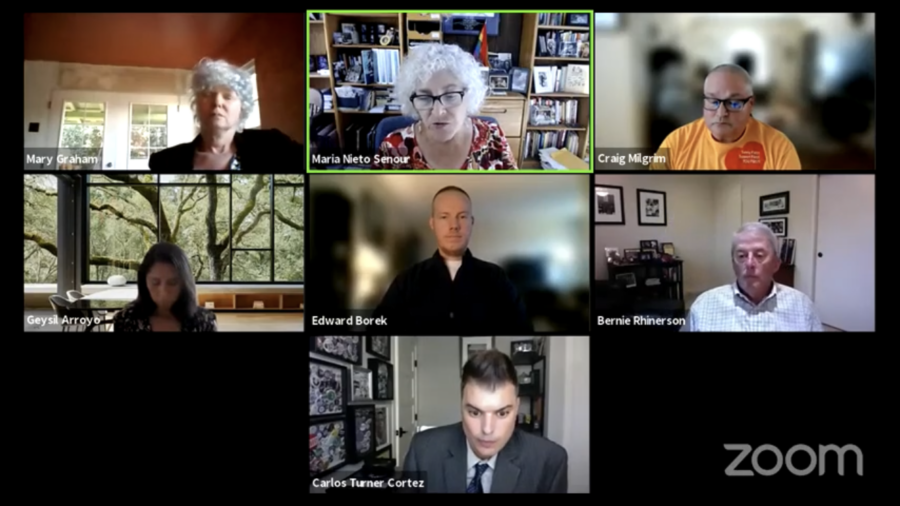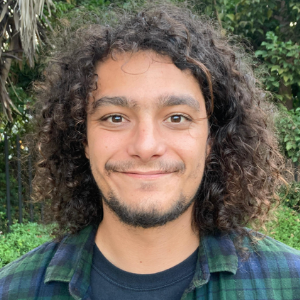Staff expresses relief, further frustration at SDCCD Board of Trustees meeting
The return-to-campus timeline has been delayed, but some student services staff want same choices as instructional staff
Due to the COVID-19 pandemic, the SDCCD Board of Trustees met on Zoom on Aug. 26 and public comments left on on the district website were read aloud. YouTube screenshot
September 15, 2021
Public comments from student staff at the San Diego Community College District Board of Trustees meeting on Sept. 9 expressed gratitude for the district’s decision to delay further return-to-campus plans, but also requested more be done.
The SDCCD Board of Trustees met on Zoom for the first time since its August 26 meeting, which was dominated by staff public comments voicing fear and frustration at the district’s return-to-campus timeline.
Following the outcry, Chancellor Carlos Turner Cortez announced on September 2 that the district would be delaying the timeline Vice Chancellor of Human Resources Gregory Smith announced in a July 1 email sent to staff.
That plan would have seen student services staff potentially being required to return to campus up to two days a week starting August 16, increasing to four days a week starting September 7, and reaching full-time, on-campus service by September 20.
In that September 2 announcement, Cortez wrote that the district would be “delaying the increase in onsite work assignments for many positions” in response to rising COVID-19 case numbers in the region.
“However, we remain committed to our goal of returning to normal, in-person operations in early 2022,” Cortez wrote then.
https://youtu.be/RZPUT5d3JLA
Of the 13 public comments left for the Board of Trustees meeting regarding SDCCD’s return-to-campus timeline, the majority were appreciative of the district’s decision to delay a full return to campus, though many asked that more be done to guarantee safety and equity.
City College counselor Jennifer Aase thanked the board for listening to staff concerns and delaying the return to full in-person service but asked that student services staff be given the same freedom to choose whether they will return to campus that was granted to instructional staff.
“There are counselors across the district volunteering to go back, much like the faculty, and that is where we should start instead of mandating all counselors back to Zoom from their office,” Aase wrote.
“It is demoralizing as a professional to be treated this way …,” Aase continued. “Even before it was decided to postpone the spring schedule, instructional deans and chairs were encouraged to schedule however the faculty feels comfortable … We deserve the same respect.”
In an interview with City Times on Sept. 1, Smith confirmed that the return to campus had been made voluntary for instructional staff, while the return was being mandated for student services staff, such as academic counselors, and attributed this distinction to timing.
“All of that planning happened … over the course of December, January, February,” Smith said then. “And those were the absolute worst months of the pandemic.”
Due to this, the district decided to only bring the classes that were the most difficult to convert to remote learning back to campus, and because this amounted to a limited number of classes, they had enough teachers to fill the spots voluntarily.
Dr. Lisa Carulli, counselor at the San Diego College of Continuing Education, said she’d been told by a colleague that the entire child development department had decided to continue to solely provide remote teaching because a return to campus was unsafe for children at this time.
“As a counselor working with this department, I have a child who is not eligible to be vaccinated but I am being asked to return to campus,” Carulli wrote. “I ask you, is my son expendable to the district?”
Unlike the dozens of comments left at the August 26 meeting, which included a letter cosigned by 36 staff members, many of the comments left for this meeting were anonymous, with multiple noting that they feared backlash and reprisals for speaking out.
In response to these fears, SDCCD Director of Communications and Public Relations Jack Beresford sought to reassure concerned staff.
“The district encourages public comment on any topic as part of a health discussion of the issues,” wrote Beresford in response to a City Times request for comment on Sept. 10. “Certainly individuals, including employees, are welcome to comment anonymously if they feel more comfortable to speak freely.”
Following the public comment section, multiple board members reaffirmed their commitment to taking staff concerns into account when making decisions about COVID-19 safety protocols and the return-to-campus timeline, including Cortez himself.
Board of Trustees member Mary Graham thanked staff for voicing their concerns and requested they continue to make their voices heard.
“I ask that you continue to work through your union, through the faculty senate and classified senates and continue of course to provide comments to us until we can find a functional and effective working environment that keeps people safe and provides opportunities to our students,” Graham said.
Maria Nieto Senour, President of the Board of Trustees, expressed appreciation for Graham’s support of staff voicing their concerns and pledged that the board is attempting to address them.
“Hopefully we will be able to work out something that will really make sense for everybody, but of course our first concern is that we educate folks and that we also keep people safe,” Senour said.
In his comments, Cortez encouraged staff to continue to bring forward their concerns, while also discussing nationwide data suggesting that the COVID-19 pandemic has worsened education outcomes for students, particularly the most vulnerable populations.
“Consistently, from K-12 data to higher (education) data, we’re seeing significant declines in vulnerable populations,” Cortez said. “It’s those students who require in-person operations. 10-15% of our Latino and African American students … just aren’t part of our student body anymore and we need to reengage all of our students, but specifically the most vulnerable amongst them.”
“We are not oblivious to the concerns that are being raised today,” Cortez continued, “through a participatory assured governance process we run this organization as a collective and we need your input and your perspective.”













